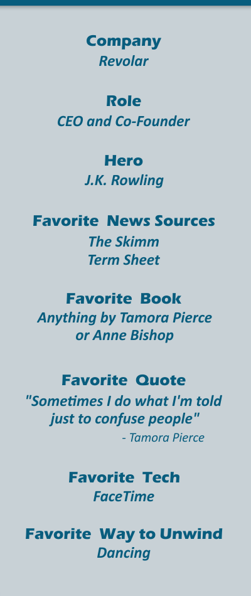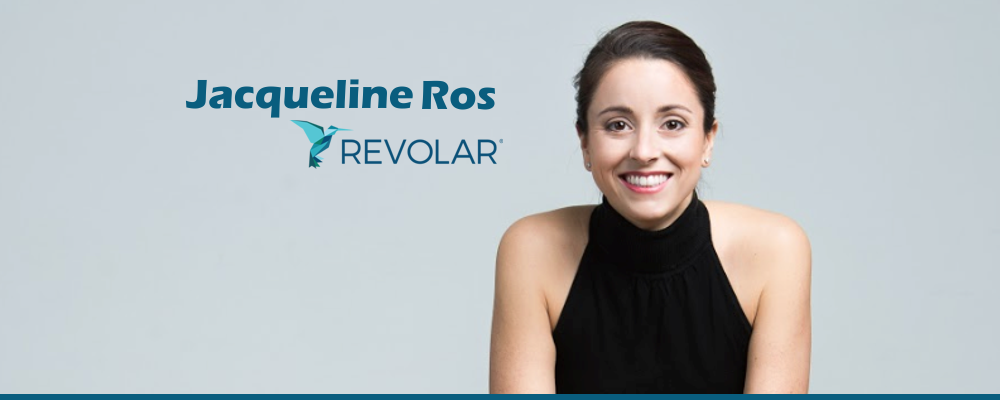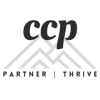In our last post we let you know that we had some important new changes to our website coming up, and today we’re excited to debut the first one.
As part of our commitment to bringing you valuable online resources to help your business succeed in Metro Denver, we’ve launched a new blog series called “The CCP Interview.”
At least once a quarter, we will sit down with a successful entrepreneur in Colorado and have them share their experiences and mentoring tips.
The goal is to help other aspiring business leaders benefit from the successes and lessons learned by others.
We couldn’t be happier that our first interview is with Jacqueline Ros, the CEO and co-founder of Revolar. Revolar is a rapidly growing wearables startup on a mission to create empowering technology that helps people keep themselves and their loved ones safe.
Be sure to visit Revolar at www.revolar.com, then read on for our in-depth interview below and let us know what you think in the comments.
Tell us a little bit about your
company, Revolar.
Revolar is a Spanish word meaning "To take flight again," and is an ode to survivors of sexual assault, like my little sister that inspired our technology.
Our products are Personal Safety Wearables that clip on and can hide under clothing, or attach to your keys.
If you're feeling uneasy or unsafe, you can press it to let your loved ones know that you made it home safe, or you can make your phone ring so you can excuse yourself from an uncomfortable situation. You can also have help sent to you depending on how you press it.
We launched about eight months ago, and we're really excited to introduce our newest product, the Revolar Instinct, to the world in May.
Did you always know that you wanted to be an entrepreneur?
No, I had very much planned on going down the non-profit route. I used to be heavily involved in Teach For America.
I never realized that I'd be going down this path. I really fell into it because I felt that I had to, in order to bring the technology I was envisioning to life for my sister.
I wanted to be able to build this for her, and the only way to do it was to start a company around it.
So, I sort of fell into entrepreneurialism, but when I think about it, my dad was an entrepreneur and I don't think the apple fell too far from the tree.
Can you tell us a little bit about how you raised the initial capital to start the business?
Absolutely. There was a lot of bootstrapping in the beginning. My co-founder and I bootstrapped for two years. We worked odd jobs for some time and then we met Seth Levine from the Foundry Group through a mentor.
Seth didn't say “yes” the first time, but we came back and had shown progress, and he was like, “Alright, let's do it.”
I'm so grateful to Seth because he really gave me my first big break. If it hadn't been for him, I don't think other people would have given us a shot.
How did you pursue Seth? I think people would appreciate how you got in front of him and built that relationship.
I'd asked for an introduction to investors and someone said, “We'll introduce you to a VC. He knows a bunch of investors”
The first time we talked, it was just to get advice. We were considering a licensing deal, which we ultimately turned down, and I wasn't intentionally trying to “woo” him. It was more that I genuinely had a ton of questions.
From some of my earlier relationships I knew that mentors really appreciate follow-up. If they give advice, they want to see you've acted on it, and you need to follow-up to show them. I just think it's common courtesy. If someone gives you their time, follow-up.
So, a couple months later I went back to Seth and he was like, “Well, what are your terms?” And I had no idea what he was talking about. I didn't want to look like an idiot, so I said, "I can get them to you quickly. We're not ready with them now, but do you have any materials or resources I could look at to make sure we're thinking the same thing?"
He emailed me a link to Brad Feld's blogs on convertible debt. And, it's just kind of history from there. I spent two days reading it, trying to understand what was happening. I plugged in numbers that were recommended by Brad. And, Seth said, “Yes.”
So, it was one of those very honest, “looking for mentorship, ended up with an investment” moments. A lot of my investors happened that way.
One of my other investors used to help me practice role playing the conversation with me asking Seth for a larger sum of cash. Then, from that practice, he ended up investing in our second round.
It's funny. It was always just a friendship or mentorship relationship. I would just say that mentors are friends whose advice you actually take.
So, would you say that your investors not only invested in your company, but they invested in you personally?
Yes, Seth said that at the early stage, at the angel stage, it was absolutely that.
They gave me my first $200,000, and I remember asking them, later on, “What were you thinking?” I was 24 then, I had no experience, so later I was like, "Now that I'm so much more aware of how hard this is, like what were you thinking?” And Seth just said, "You were so scrappy. You made so much happen with so little money. I just wanted to see what would happen if I gave you a little bit more and a boost up in credibility."
Because, essentially, more than anything what they gave me was credibility. They made other people pay attention to us, and they were advocates and sponsors in that way. It was beyond mentorship. It was sponsorship, right? They went to bat for me multiple times, and they have continued to do so.
So, I worked my butt off for them and my goal is to make sure I really deliver. I consider them part of my team, and I want my team to see the most returns humanly possible for investing in our vision, our shared vision.
That's very inspiring. For your current round of funding, you chose to launch through Indiegogo. Why that route and how is it going?
We launched the Indiegogo campaign in April, and we went that route because fundraising is hard — especially for a hardware company. That's been a real struggle, and we needed to have a really strong launch to this product. We needed to get the word out there so that we could get the support for continuing to move forward.
As a company, as a small startup, you have to constantly prove yourself. Our first product was an awesome step in the right direction. We learned a ton from that product, but we have to be constantly improving. We worked really hard to iterate on the technology, to make it beautiful, to make it more fun, something you want to wear every day.
We took everything we learned from version one and applied it, and we needed help getting the word out, and it's a small company. We have limited resources, and Indiegogo gives us the platform to reach a wider audience than we could on our own. So super grateful for that.
If somebody wants to invest or donate on Indiegogo, how do they go about doing that?
The campaign is live now at www.indiegogo.com/projects/revolar-smart-safety-to-protect-loved-ones#/. You can donate as little as $1, or buy a single device, or buy a community pack for you and your loved ones.
I'm really excited for what we built. It's really, it's just such a pretty wearable. I've always said that wearables needed to get prettier for women, and we made it to be elegant and beautiful, and I hope everyone really enjoys how much love we put into our second product.
Would you recommend crowdfunding over traditional venture capital to other women entrepreneurs?
Yes, I mean, hardware's hard. Somebody once described it as the double black diamond of startups. They were right. It costs a lot more money to get a hardware product off the ground. Investors are more cautious, and they need proof that the product will be a success.
Even so, we accomplished that with our first product, through a successful Kickstarter campaign. We proved that people would buy our technology. And, if they were willing to buy our technology, we could build the product.
I think that the combination of a crowdfunding campaign and a VC investment can be really strong in this way. That’s why we’re taking a similar approach with our latest product. Plus, the choice to add-on a crowdfunding campaign is also about getting our stride, and getting our foot into the consumer's door. We call them our early Revolarians.
I think the one thing women entrepreneurs, or just any entrepreneur should keep in mind is that there's always the opportunity for multiple sources of funding, and you have to constantly be fighting to access all of those sources.
I can't just rely on investors, and I can't just rely on crowdfunding, and I can't just rely on grants. It's going to have to be all those things rolled into making this a reality.
What general advice would you give to other women considering launching their own company?
I’ve thought about this a lot because I get asked this question a lot. I think one of the hardest parts is that as a woman in business, as a woman in tech, we're all aware of the discrimination — of sexism, of racism, and being a minority female.
I’ve felt it. I hear things like, "You're so articulate for somebody your age." It's not a major comment, but it says a lot about how they view me, that they think I am articulate for my age versus an articulate CEO that has taken their company to the next phase of growth.
It starts to drive your head nuts. You start to think, “Are they not taking me seriously? Are they not listening? What's the issue?” I just read this article today that said it's like a bunch of tiny little paper cuts that add up.
So, the best advice I can give is those things are not going to go away in our lifetime. We can take massive strides in improving those things, but they are not going to go away.
And so, somebody once told me, they looked me dead in the face and they said, "Bias exists and you're just gonna have to get over it and be confident enough in yourself to not let that mess with your game."
I think about when I used to play basketball. I love sports and I think about how the other players try to get in your head, they try to psych you out.
The problem with being a woman of business, a women of tech, is that you don't need anybody else psyching you out, you start to psych yourself out.
And so, catch yourself and remind yourself that you've gotten this far because of how hard you worked and how smart you are, and the amazing things you've accomplished and just keep going.
Because, there's always going to be people who think you got there because you're the token, or people who think you got there because of XYZ. The reality is, you worked really hard and you freaking earned it. One of my other favorite quotes is, "Ginger had to do what Fred Astaire did, except backwards and in heels."
I've struggled with it. I leave an investor meeting and I get that pit in my stomach, and wonder, "Oh wow! Was I being respected? Was I being taken seriously?" And the fact is, they don't really know who you are yet. Give people a chance to get to know you, and a chance for you to prove them wrong.
You just have to keep going. Like 50 Cent. This is a weird person to quote, but 50 Cent said people thought he was arrogant because he had to be so confident in his own abilities, to get to where he got to, because nobody else will believe in you other than yourself or your mother, right?
My mom's probably the only person who believes in me more than I do. And, that's how it has to be. You can't be looking for affirmation from other people, you have to have that self-affirmation and quiet that voice in your own head.
Do you have advice for those that have already launched and are working on their growth?
Marketing. Pay really tight, close attention to your marketing. Be obsessive about the data. Be incredibly data-driven. Marketing is really a data-driven art. It feels funny to describe a piece of art as data-driven, but it is. It's creativity applied to data.
And it's hard. It's a lot harder than I thought. But if your marketing is going well, and things are going well, the rest will come together. Above all else, businesses are sales and marketing engines, and those engines have to be strong.
What do you think are the best online resources for female leaders?
I think the stage you’re at very much determines what resources are required. So early on, I'd follow incubators and accelerators and read their articles.
Brad Feld, reading his blogs and the blogs done by the Foundry Group are incredibly beneficial. I wish I'd discovered them sooner. Reading venture deals by them changed my world. Understanding how investors function is life changing for an entrepreneur working with VCs.
On a day-to-day I follow everything that Li and Fung sends out. And I follow Deborah Weinswig on the trends being seen in technology around the world and in the industries that affect retail products. I also follow the Term Sheet which tells me about the funding landscape and different pieces like that.
What are your thoughts on the importance of office culture in workspace environments?
I think it's critical. You're spending more time with your team than you do your own family. You have to be pretty obsessed with the people you're working with for that to function, there's no other way of putting it. You have to be completely obsessed and want them to be happy.
I consider taking care of them to be a huge chunk of my job because people are the most important part of any business, and so you have to take care of it. You have to take care of them, and it's not always easy and it's not maybe always the way that you would want to be able to do things for them, but I think it's critical.
I've learned a lot about being a manager from my co-founder. She's a really great manager, and she takes a lot of pride in what she does. I've learned tremendous amounts from her, and I try to focus on being kind and empathetic as much as I can, but it's never easy.
I recently toured your office. I noticed a couple fun things that kind of add to your office culture?
Yes. We have our values hanging up and we try to talk about what they mean and why they mean the things that they mean.
We have champagne bottles with goals written on them — and we always have apple cider too because I think it's very important to have things that are non-alcoholic — and pop those open to celebrate when we hit that next milestone, that next goal.
We'll have team meals to just kind of hang out and get to know each other beyond work. So, yes, it's a community within a community, and so it's something that I very much enjoy being a part of, I like being a part of a team.
Lastly, do you think the layout of your office has an impact on attracting top talent?
Oh my God, yes! Even the location, having some easy places for them to park and walk to food, that makes a huge impact on whether people want to work for you. Nobody wants to work in an ugly, uncomfortable space.
I think that space is very important and I think too often people neglect it. And it's like house hunting, if you keep looking you'll find the right one that's in your price range, but you just have to keep looking and not settle for something that would be way less comfortable.
Like what your reading? Subscribe to be alerted whenever new blogs post.




